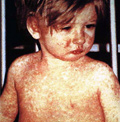 Marc Sprenger told EU health ministers to up their game or risk Europe falling further behind other developed regions.
Marc Sprenger told EU health ministers to up their game or risk Europe falling further behind other developed regions.
He called for leadership from national governments in the – a disease which has surged in Europe this year, with particularly alarming outbreaks in France.
Routine vaccination systems need to be reinforced to ensure that 95% of children have received two MMR doses, according to the ECDC. But Sprenger warned that this alone will not be enough and health authorities will have to run catch-up campaigns targeting children and young adults who missed out on vaccination in the past.
MMR ‘effective and inexpensive’
The ECDC has published details of Sprenger’s plea to health ministers which came as agreement was finalised on an .
He said vaccinations were a “victim of their own success” with many Europeans unaware of the risks related to vaccine-preventable diseases.
Sprenger said that as an immediate consequence of parents deciding against having their children immunised against measles and rubella, Europe has missed the 2010 target to eliminate both diseases.
All European countries have now signed up to a new target of wiping out measles by 2015 but nearly all of EU’s 27 Member States are falling short in terms of vaccine coverage.
“The MMR vaccine has an excellent safety profile. It is effective and inexpensive. Measles is not harmless. The complication rate is high and up to 20% of cases may require hospital care. Some complications may lead to long-term disability and even death,” Sprenger told ministers.
Social media
Whether public health authorities can win over the public will decide whether Europe makes the 2015 target or falls short. Sprenger said the science-base underpinning immunisation. programmes is “indisputable” but “the challenge is to put these principles into public health practice”.
He has also stressed the need to put communications at the heart of immunisation efforts. In an interview last week, the ECDC chief said anti-vaccine activists had been quicker to harness the power of social media sites like Twitter and Facebook, leading to the amplification of misleading messages.
“I don’t want to blame social media, but we have to be aware that this is a factor and so we need to be employing social media as well, with objective information to counteract this,” he told the EU Observer.
ECDC action plan
Sprenger told health ministers that ECDC experts are working on a detailed “action plan” with four key points:
- An effective communication strategy to reinforce the trust of parents on vaccination and health care workers on its priority. The ECDC could help present the arguments for vaccination in a clear and understandable way, “for example in a pro-vaccine web site in all languages”, according to Marc Sprenger.
- Assistance with monitoring and assess immunisation programmes in your countries.
- Regional workshops to help share experiences between neighbouring countries.
- The collection of Europe-wide data on diseases but also on vaccine coverage, allowing countries to develop targeting vaccination programmes.
Have your say: Do you have first-hand experience of Europe’s measles outbreak?
External links
EU Observer: Brussels to combat vaccine-scepticism after record EU measles outbreak
EDCD: Marc Sprenger’s speech to EPSCO
Related news from Vaccines Today





Luella
June 22nd, 2011
Super ifnroamtive writing; keep it up.
Jocelyn
June 27th, 2011
That is the most great article that I have ever come across after huge searches. I’m really grateful to yourself for providing this special info.